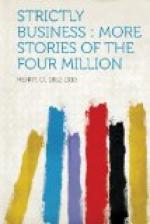“I know—I know,” said Forster, nodding approval.
“I returned to New York to-day,” continued Ives, “from a three years’ ramble around the globe. Things are not much better abroad than they are at home. The whole world seems to be overrun by conclusions. The only thing that interests me greatly is a premise. I’ve tried shooting big game in Africa. I know what an express rifle will do at so many yards; and when an elephant or a rhinoceros falls to the bullet, I enjoy it about as much as I did when I was kept in after school to do a sum in long division on the blackboard.”
“I know—I know,” said Forster.
“There might be something in aeroplanes,” went on Ives, reflectively. “I’ve tried ballooning; but it seems to be merely a cut-and-dried affair of wind and ballast.”
“Women,” suggested Forster, with a smile.
“Three months ago,” said Ives. “I was pottering around in one of the bazaars in Constantinople. I noticed a lady, veiled, of course, but with a pair of especially fine eyes visible, who was examining some amber and pearl ornaments at one of the booths. With her was an attendant—a big Nubian, as black as coal. After a while the attendant drew nearer to me by degrees and slipped a scrap of paper into my hand. I looked at it when I got a chance. On it was scrawled hastily in pencil: ’The arched gate of the Nightingale Garden at nine to-night.’ Does that appear to you to be an interesting premise, Mr. Forster?”
“I made inquiries and learned that the Nightingale Garden was the property of an old Turk—a grand vizier, or something of the sort. Of course I prospected for the arched gate and was there at nine. The same Nubian attendant opened the gate promptly on time, and I went inside and sat on a bench by a perfumed fountain with the veiled lady. We had quite an extended chat. She was Myrtle Thompson, a lady journalist, who was writing up the Turkish harems for a Chicago newspaper. She said she noticed the New York cut of my clothes in the bazaar and wondered if I couldn’t work something into the metropolitan papers about it.”
“I see,” said Forster. “I see.”
“I’ve canoed through Canada,” said Ives, “down many rapids and over many falls. But I didn’t seem to get what I wanted out of it because I knew there were only two possible outcomes—I would either go to the bottom or arrive at the sea level. I’ve played all games at cards; but the mathematicians have spoiled that sport by computing the percentages. I’ve made acquaintances on trains, I’ve answered advertisements, I’ve rung strange door-bells, I’ve taken every chance that presented itself; but there has always been the conventional ending—the logical conclusion to the premise.”
“I know,” repeated Forster. “I’ve felt it all. But I’ve had few chances to take my chance at chances. Is there any life so devoid of impossibilities as life in this city? There seems to be a myriad of opportunities for testing the undeterminable; but not one in a thousand fails to land you where you expected it to stop. I wish the subways and street cars disappointed one as seldom.”




